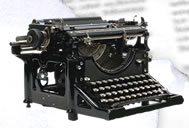This cartoon was created to mark April 7, 1933 - the day real beer was once again permitted to be sold across the country; from sea to shinning sea, one million barrels of the amber liquid was consumed by the citizens of a grateful nation.
Click here to see how weird the first car radios looked.
During the action-packed opening months of the F.D.R. administration, Congress addressed the option of repealing Prohibition and allowing each state to decide whether it wished to be
dry or
wet:
"Now the people can decide, after more than thirteen years of Prohibition."
"Surprising the country, the lame-duck Congress, hereto staunchly dry, reverses itself 'in a stampede toward repeal,' to permit the people to decide Prohibition's fate."
The attached article is composed of numerous newspaper observations that appeared in print throughout April of 1933; these perceptions all pertain to the goings on that followed in the joyous wake of Prohibition's demise:
"'The return of beer has really been a remarkable phenomenon,' says The New York Evening Post.
'Not one of the bad effects predicted for it actually took place'."
In 1959 an eyewitness to American Prohibition recalled the unbridled glee that spread throughout the land when the
Noble Experiment called it quits (December 5, 1933):
"The legal celebrations that were held on the first night of repeal were mostly in keeping with the wet organizations' desire to show that this was an historic moment far more important for the freedom of choice it restored to the public. In New Orleans cannons were shot off, whistles blown and city-wide parades held to greet repeal. Boston bars, permitted by lenient local authorities to stock up with legal booze into the night, were so packed by ten o'clock that a latecomer was lucky to get inside the doors, much less get a drink. The next day there were long lines of 100 and more people in front of liquor stores from early morning until closing..."
During the summer of 1932, Democratic Senator Carter Glass (1858 - 1946) turned heads and dropped jaws on Capitol Hill when he introduced a piece of legislation that was intended to water-down the 18th Amendment. Glass, a devoted enemy of the swizzle stick, proposed an amendment to the Constitution that would continue to outlaw saloons nationally while permitting hootch to flow freely throughout the wet states - and cut off booze in the dry.
"Americans on December 5 [1943] will look backwards to a dramatic night 10 years ago - many will be surprised that a whole decade has passed since the nation abandoned Prohibition... In the early '30s, Congressman LaGuardia found authorities siphoning an estimated million dollars a day in graft from bootleggers. Cost of the 'Noble Experiment' to the government hovered around a billion dollars a year. In the last 14 Prohibition years, the public was figured to have spent more than $36,000,000,000 for bootlegging and smuggled liquor!"
Having suffered the scourge of
the noble experiment for over ten years, Dudley Cammet Lunt, an attorney, penned this essay about how the states could be done with that Federal edict:
"In discussing Article V in The Federalist Papers [Alexander Hamilton] said: 'We may safely rely on the disposition of the State legislatures to erect barriers against the encroachments of the national authority.'"
"With the [Prohibition] Repeal, approximately one million people went back to work, making wine, beer and distilled spirits, bottles and barrels; transporting, selling and serving and advertising it. Innumerable industries indirectly connected with liquor, such as printing, building and machinery-making, received a sharp stimulus. With Repeal also, sorely needed tax money started to roll into the public coffers. Since 1933 more than two billion dollars in liquor taxes has gone into national, state and local treasuries..."
What was to be done with all the racketeers who dominated the Twenties once Prohibition was
prohibited? Organizing the collective labor of truck drivers seemed to have been the most obvious project for the kingpins, but what of the average foot soldier?
"Even the rank and file have not been driven to the breadline. Current quotations for gunmen have fallen from $300 a week to as low as $100. Plain sluggers command even scantier wages. A fancy pineapple job once cost $250; by 1933 you could get a good workman for $50."
Writing Prohibition's obituary during the Winter of 1933, Bertrand Russel (1872 - 1970) came away thinking that the best thing that could ever be said about Prohibition was that it served to put an end to that line of Victorian thinking that held up women as morally superior to men.
"Now, therefore, I, Franklin D. Roosevelt, President of the United States of America,...do hereby proclaim that the Eighteenth Amendment to the Constitution of the United States was repealed on the 5th day of December, 1933..."
